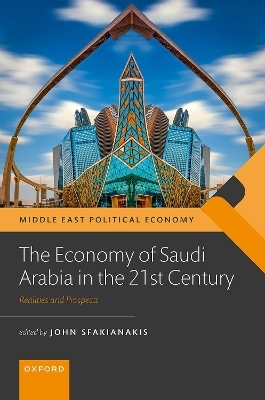
The Economy of Saudi Arabia in the 21st Century
Oxford University Press (Verlag)
978-0-19-886387-8 (ISBN)
This book is about Saudi Arabia's efforts to overhaul its economy and the numerous prospects and challenges it faces in doing so. As one of the world's leading oil producers, the outcomes of the most ambitious wave of reforms Saudi Arabia has ever undertaken will provide valuable lessons not only for the kingdom itself but also for other oil-dependent and resource-based economies.
Since 2016, Saudi Arabia has embarked on an unparalleled economic - if not social and political - transformation project with an ultimate aim of diversifying away from oil. New sources of growth such as tourism, industry, and entertainment have been identified, but it remains to be seen whether these will be enough to sustain the economy in the post-oil era. Reforms, including lowering energy subsidies, instituting VAT, and introducing indirect taxes on labor and businesses, have already produced notable results.
Looking ahead, the economy requires rigorous and continuous processes of severe competition amongst its private sector participants as well as strong institutions. It also requires creative destruction to be allowed to run its course within the wider economy. The economic reform experiment undertaken by Saudi Arabia remains the most sweeping among emerging market economies - and certainly in the entire Middle East. The changes are all encompassing and involve a complex redrawing of the political, economic, religious, and social map.
John Sfakianakis is Senior Scholar at the Judge Business School and Pembroke College, University of Cambridge, and Chief Economist and Head of Research at the Gulf Research Center.
John Sfakianakis: Introduction: The Epoch of Reform
Part I. Stock Taking
1: John Sfakianakis and Zafiris Tzannatos: The Entropic Growth of the GCC Economies: Will Saudi Arabia be Different in the Future?
2: Bassam Fattouh: Saudi Oil Policy: Continuity and Change in the Era of the Energy Transition
3: Nabil Ben Ltaifa and Tim Callen: Fiscal Policy: The Past, the Present, and the Future
4: Rodney Wilson: Monetary Policy, Banking, and the Financial System
5: Karen E. Young: Saudi State Capitalism
Part II. Economic Themes
6: Zafiris Tzannatos and John Sfakianakis: Decolonizing the GCC: The Case of the Labor Market in Saudi Arabia
7: Jumana Jamal Subhi Alaref: Understanding Social Protection Policy Reform and its Impact in Saudi Arabia
8: Aisha Al-Sarihi: Environment and Climate Change: Do they Synchronize with the Saudi Arabia Economy?
9: Kristin Diwan and Larry Fallin: The New Industries: Tourism and Entertainment in a Changing Saudi Arabia
Part III. The Future
10: Mark C. Thompson and Neil Quilliam: Saudi Vision 2030: Repurposing Ministries and Creating New Institutions
11: Steffen Hertog: The Political Economy of Reforms under Vision 2030
12: Giacomo Luciani: Saudi Arabia: Beyond the Rentier State?
John Sfakianakis: Conclusion
| Erscheinungsdatum | 23.08.2024 |
|---|---|
| Reihe/Serie | Middle East Political Economy |
| Verlagsort | Oxford |
| Sprache | englisch |
| Maße | 160 x 240 mm |
| Gewicht | 836 g |
| Themenwelt | Geschichte ► Teilgebiete der Geschichte ► Wirtschaftsgeschichte |
| Wirtschaft ► Volkswirtschaftslehre ► Wirtschaftspolitik | |
| ISBN-10 | 0-19-886387-X / 019886387X |
| ISBN-13 | 978-0-19-886387-8 / 9780198863878 |
| Zustand | Neuware |
| Haben Sie eine Frage zum Produkt? |
aus dem Bereich


